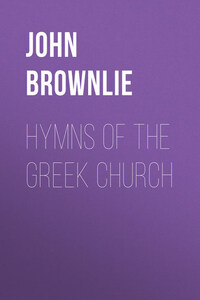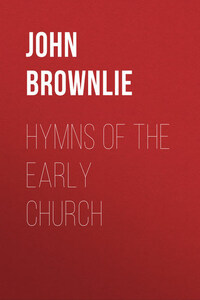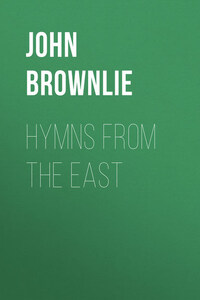“This work at its best reaches the level of absolute excellence, and the book is entitled to a warm and grateful welcome.” —Record.
“Mr Brownlie has taste and a poetic gift, and his verses are easy and natural, rarely, if ever, betraying the fact that they are the work of a translator.” —Church Times.
“This dainty volume will certainly enhance his reputation.” —Glasgow Herald.
“It brings into dignified Church-English some sixty simple and powerful hymns. The book should prove welcome to men generally interested in hymnody, and particularly to those who are ignorant of the richness of the Greek liturgy.” —Scotsman.
“Mr Brownlie has the knack of hymn-writing, and the translations from the Greek which he has published in this book will be a welcome addition to English hymnology.” —Athenaeum.
“Mr Brownlie has done eminent service as a hymnologist and translator of hymns. These translations are in smooth and flowing English verse, and the hymns are interesting both on their intrinsic merits and as representing the religious thought and emotion of an important section of the Church.” —Aberdeen Free Press.
After ten years this, the first of five series of hymns of the Greek Church, is issued in cheap form in the hope that those who regard the unity of Christian praise, and wish to realise it, and who seek its enrichment from the Church of the Apostles, may be induced to give the subject that consideration which it deserves, and which has been too long neglected.
The past ten years have seen much activity in the department of Church hymnody, – all sections of the Church have had their hymnals under revision with varied results; but in this particular we are bound to feel satisfaction that the praise literature of the Early and Mediaeval Church has been more fully drawn upon than at any former period, and the Greek Church no longer stands in the background. From this volume alone no fewer than ten renderings have been utilised by hymnal compilers, and they make together twenty appearances. This fact is mentioned to indicate an appreciation of Greek hymnody which, it is hoped, may grow.
I. Thirty-eight years ago, Dr. John Mason Neale published his Hymns of the Eastern Church, and for the first time English readers were introduced to the priceless gems of Greek hymnody. At the close of his preface he throws out a challenge which, as far as the present writer is aware, has not yet been taken up. He says: ‘And while fully sensible of their imperfections, I may yet, by way of excuse rather than of boast, say, almost in Bishop Hall’s words —
“I first adventure: follow me who list,
And be the second Eastern Melodist.”’
It would be presumptuous to believe that the translations which follow are in any particular a worthy answer to that challenge; but the translator can honestly say that they are a very earnest attempt to acquaint English readers still further with the valuable praise literature which lies buried in the service-books of the Greek Church, and they constitute the first real attempt in that direction since Dr. Neale issued his collection in 1862.
II. The renderings contained in this volume are the product of many happy hours during the past five years. No method was adopted in the work. As the translator waded through the closely printed pages of the Greek offices, what appeared at first sight to be lines worthy of translation were taken up and examined, sometimes to be cast aside again because of some unremovable blemish, at other times to be moulded to the form which they now bear. Of the forty-seven pieces, thirty-five appear for the first time in English verse.
For the original, the translator has gone to the service-books, and for the most part has confined himself to the hymns which are to be found in the Triodion, containing the Lenten services; and in the Pentecostarion, in which are found the hymns for the services of Easter and Pentecost. A few specimens are also given from other offices, particularly that for Christmas.
Renderings from the work of the earlier Greek hymn-writers are added at the end of this volume; but, unlike the hymns of the Church service-books, these hymns originally are in the classical measures, and illustrate the work of the best Christian poets, who in some cases wrote extensively.
III. It is a very remarkable fact, and certainly not to our credit, that, with the exception of a very few who have made the study a specialty, our educated men show a most unaccountable ignorance of the most attractive and valuable material for praise and prayer contained in the Greek Church service-books. We have learning more than enough, and zeal enough for the pursuit of study in other departments, but this unworked field lies fallow, and no one thinks it worth his while to cultivate it. That the study will reward the student, although not in a material sense – for the meaningless prejudice of the great mass of our people for what is local and against the thought of the stranger, no matter how beautiful it may be, is still to be reckoned with – yet in the highest sense as conferring upon him a new delight, there can be no doubt; for, after the necessary expenditure of patient application, and the passing of the initiatory stages which in every department of study are somewhat trying, the attraction will begin, and the subject become positively fascinating. To any one having the lyrical gift and the necessary qualifications for the study of Greek, those service-books might prove a mine of treasure inexhaustible. In the seventeen quarto volumes which contain the Greek Church offices, there must be material of one kind or another for many thousands of hymns; yet, when hymnal compilers ask for hymns from the Greek for their collections, they are not to be had, save in the few renderings made by Dr. Neale. In the most recently compiled collection for church use —










